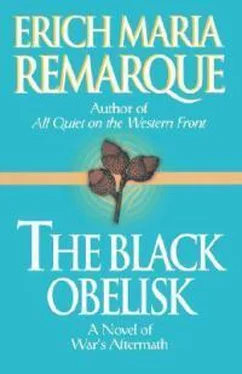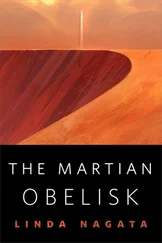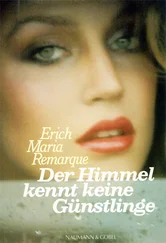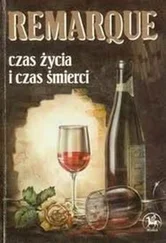“Here’s the finest thing we have,” I say. “Black Swedish granite, a memorial cross with a double socle. There aren’t more than two or three like it in the whole city.”
The ladies examine the drawing. It is one of my last. I have put Major Wolkenstein in the inscription—as having fallen in 1915 at the head of his troop—which would certainly have been a blessing for the carpenter in Wüstringen.
“Was the Horse Catholic?” Fritzi asks.
“A cross is not just for Catholics,” I reply.
The Madame scratches her head. “I don’t know whether she would have cared for anything as religious as that. Isn’t there something else? Something more like a natural rock?”
For an instant my breath leaves me. “If you want something of that sort,” I say, “I have just the thing. Something extraordinary! An obelisk!”
It is a shot in the dark, I know. My fingers suddenly trembling with the excitement of the chase, I search for the drawing of the veteran and lay it on the table.
The ladies study it in silence. I hold back. Sometimes there is a kind of beginner’s luck that accomplishes with a child’s touch things that would baffle the expert. Fritzi suddenly laughs. “Really not bad for the Horse,” she says.
The Madame smiles too. “What does the thing cost?”
For as long as I have been in the business, no price has ever been put on the obelisk, since everyone knew it was unsalable. I calculate quickly. “A thousand marks is the official price,” I say. “For you, as friends, six hundred. For the Horse, as my teacher, three hundred. I can take the chance of making this ridiculous price because this is my last day in the office—otherwise I’d be fired. Cash payment of course! And the inscription extra.”
“Well, why not?” Fritzi says.
“It’s all right with me!” the Madame nods.
I can’t trust my ears. “Then it’s a deal?” I ask.
“A deal,” the Madame replies. “How much is three hun-red marks in gulden?”
She begins to count out the notes. A bird shoots out of the cuckoo clock on the wall and chirps the hour. It is six o’clock. I put the money in my pocket. “A schnaps to Malvina’s memory,” says the Madame. “She’ll be buried tomorrow morning. We need the place again for the evening.”
“Too bad I can’t stay for the funeral,” I say.
We all drink cognac with a dash of crème de menthe. The Madame wipes her eyes. “It touches me deeply,” she remarks.
It touches us all. I get up and say good-by. “Georg Kroll will install the monument,” I say.
The ladies nod. I have never met so much loyalty and good faith as here. They wave to me from the windows. The bulldogs bark. I walk quickly along the brook toward the city.
“Impossible!” Georg says. Silently I take the Dutch gulden out of my pocket and spread them on the desk. “What have you sold for all that?” he asks.
“Just a minute.”
I have heard the tinkle of a bicycle bell. Immediately thereafter there is the sound of an authoritative cough at the front door. I pick up the bills and put them back in my pocket. Heinrich Kroll appears in the doorway, the cuffs of his trousers somewhat soiled by the dust of the roads. “Well,” I ask, “sold anything?”
He stares at me venomously. “Go out and try to sell something yourself! There’s a state of general bankruptcy. No one has money! And anyone who has a couple of marks holds onto them!”
“I was out,” I reply, “and I sold something.”
“Did you? What?”
I turn so that I have both brothers in front of me and say: “The obelisk.”
“Nonsense!” Heinrich says curtly. “Go make your jokes in Berlin!”
“I have nothing more to do with the business, of course,” I explain, “inasmuch as my employment terminated at twelve o’clock today. Nevertheless, I wanted to show you how simple it is to sell tombstones. A kind of vacation job really.”
Heinrich swells with rage, but restrains his anger. “Thank God we won’t have to listen to this sort of nonsense much longer! Have a good trip! They’ll teach you to talk respectfully in Berlin.”
“He has actually sold the obelisk, Heinrich,” Georg says.
Heinrich stares at him incredulously. “Prove it!” he barks at length.
“Here!” I say, letting the gulden notes flutter down. “Even in foreign exchange!”
Heinrich gapes at the notes. Then he seizes one of them, turns it over and examines it to see whether it is genuine. “Luck,” he snaps finally. “Fool’s luck!”
“We can use such luck, Heinrich,” Georg says. “Without this sale we couldn’t have paid the note that’s due tomorrow. You ought to thank him warmly. It’s the first real money we’ve seen. We need it damned badly.”
“Thanks him? I’d rather die!”
Heinrich disappears, slamming the door—a genuine, honest German who owes thanks to no one. “Do we really need the money so badly?” I ask.
“Badly enough,” Georg replies. “But now let’s do some figuring. How much have you?”
“Enough. I was given traveling expenses third class. I’m going fourth class and so will save twelve marks. I sold my piano—I couldn’t take it with me. The old box brought a hundred marks. That is, all told, one hundred and twelve marks. I can live on that till I get my first pay.”
Georg takes thirty Dutch gulden and offers them to me. “You worked as a special agent. That means you have a right to a commission just like Weeping Oskar. For extraordinary services, five per cent additional.”
A short argument ensues; then I take the money, as an anchor to windward in case I am fired during the first month. “Do you know yet what you’re going to have to do in Berlin?” Georg asks.
I nod. “Report fires, describe thefts, review unimportant books, fetch beer for the editors, sharpen pencils, correct proof—and try to get ahead in the world.”
The door is kicked open. Like a ghost Sergeant Major Knopf stands in the doorway. “I demand eight trillion,” he croaks.
“Herr Knopf,” I say. “You have not yet altogether awakened from a long dream: the inflation is over. Two weeks ago you could have got eight trillion for the stone you paid eight million for. Today the price is eight marks.”
“You rat! You did it on purpose!”
“What?”
“Stopped the inflation! To exploit me! But I won’t sell! Ill wait for the next one!”
“What?”
“The next inflation!”
“All right,” Georg says. “We’ll have a drink on that.”
Knopf is the first to reach for the bottle. “Want to bet?” he asks.
“On what?”
“That I can tell by taste where this bottle came from.”
He pulls out the cork and sniffs. “It’s impossible for you to tell,” I say. “With schnaps from a cask, perhaps—we know you’re the greatest expert in the district—but with schnaps in bottles never.”
“How much will you bet? The price of the headstone?”
“We’re suddenly impoverished,” Georg replies. “But we’ll risk three marks. To oblige you.”
“All right. Give me a glass.”
Knopf smells and tastes. Then he demands a second and a third glassful. “Give up,” I say. “It’s impossible. You don’t have to pay.”
“This schnaps is from Brockmann’s Delicatessen Store in Marienstrasse,” Knopf says.
We stare at him. He is right. “Hand over the money!” he croaks.
Georg pays the three marks, and the sergeant major disappears. “How was that possible?” I say. “Has the old schnaps thrush second sight?”
Georg laughs suddenly. “He tricked us!”
“How?”
He lifts the bottle. On the back at the bottom in a tiny label: J. Brockmann, delicatessen, 18 Marienstrasse. “What a sharpie!” he says with amusement. “And what eyes he has!”
Читать дальше








